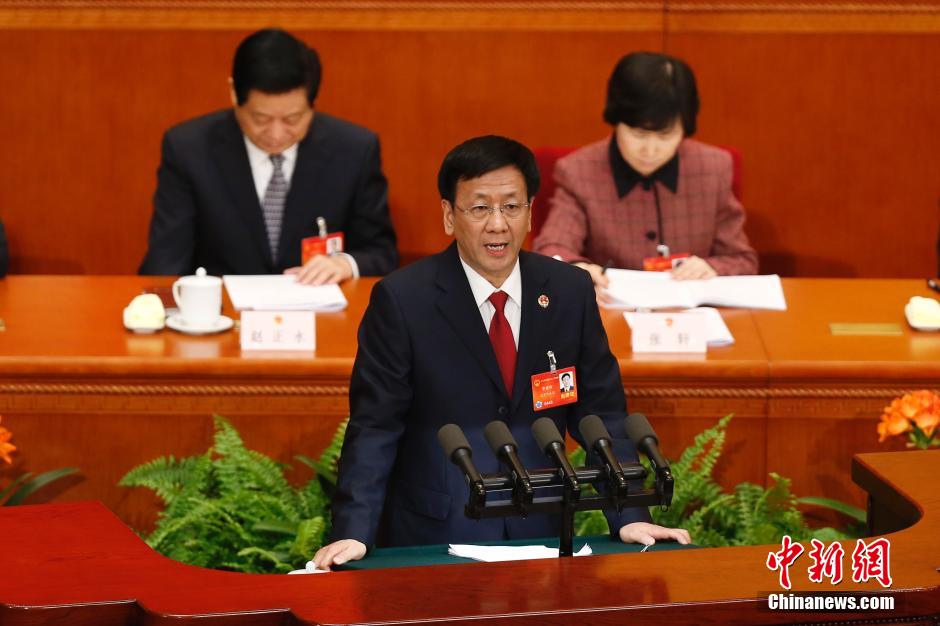Hunts for fugitives to intensify
 0 Comment(s)
0 Comment(s) Print
Print E-mail China Daily, March 12, 2014
E-mail China Daily, March 12, 2014
|
|
| Cao Jianming, procurator-general of the Supreme People's Procuratorate, the country's highest prosecution body, delivers work report on Monday afternoon. [CNS photo] |
Prosecutors nationwide will clamp down on corrupt officials this year and step up the hunt for those who have fled abroad, according to the top procurator.
Preventing suspects from fleeing the country and tracing those who have escaped are important measures for prosecutors in fighting graft, Cao Jianming, procurator-general of the Supreme People's Procuratorate, the country's highest prosecution body, told China Daily.
For example, those suspected of duty-related crimes who might flee abroad will be banned more quickly from leaving China, and supervision will be tightened on officials, he said.
Duty-related crimes generally refer to offering and taking bribes and dereliction of duty. In China, the investigation and prosecution of such crimes are in the hands of procuratorial organs.
Cao said prosecutors will also work more closely with judicial organs abroad to expand channels and measures to hunt those who have fled and to recover ill-gotten gains.
Authorities will also start procedures to confiscate illegal assets of fugitives abroad. "Once evidence is sufficient, we'll initiate the confiscation procedure according to the law," he said.
Corruption has been a lingering problem in China. President Xi Jinping has warned that the fight against graft concerns the Communist Party of China's survival and has called for tougher measures.
The top procuratorate says that 37,551 cases of duty-related crime were investigated last year, an increase of 9.4 percent from the previous year. The cases involved 51,306 people, 8.4 percent more than in 2012.
There has been a sharp increase in high-level officials involved in such cases.
Eight officials at ministerial level and 253 above bureau-chief level were investigated for graft last year. The combined number was an increase of about 42 percent from 2012.
Cao said 10.14 billion yuan ($1.65 billion) in "dirty money" and property was recovered and 762 corruption suspects were captured at home or abroad last year.
An annual report on China's rule of law published last month warned that more corrupt officials would flee abroad to escape punishment following the intensified efforts.
The Ministry of Public Security says that China has more than 500 economic fugitives abroad, most of them in the United States, Canada and Southeast Asian countries.
A number of steps are usually involved when corrupt officials flee, the top prosecution body says.
First, they send family members abroad to start a business or to study. Then, they transfer property by money laundering through underground banks or illegal investment, before they have the chance to flee themselves.
Cao acknowledged that due to the political and legal hurdles involved in extradition, evidence collection and application of the death penalty, Chinese judicial officers face challenges in capturing fugitives and the proceeds of their crimes.
Li Lin, a member of the Beijing Lawyers Association, said that because China lacks extradition treaties with many countries, preventing corrupt officials from leaving China is the key.
She suggested that disciplinary and procuratorial authorities widen channels to collect intelligence.
Once there are signs that a corrupt official might flee, timely measures must be taken, such as freezing assets and enhancing border checks.
Cao said corruption has its roots in the abuse of power. "The key is to improve supervision over power and prevent officials from using it for personal gain."
He said the sectors worst hit by corruption include engineering, construction, land approval and real estate development. "Power is centralized and capital flow is intense in these sectors," Cao said.
This year, anti-graft authorities will pay more attention to the promotion of officials and to malpractice in areas related to people's livelihoods, such as social security and housing demolition, he said.






